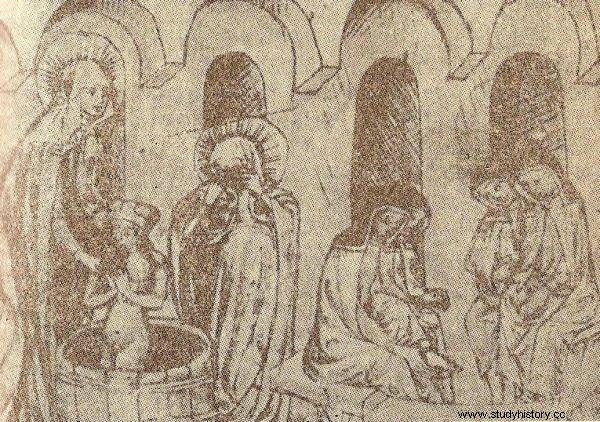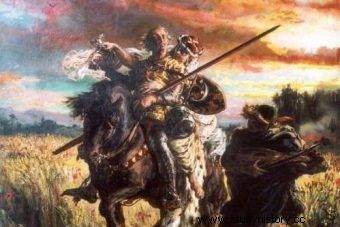The family black sheep - this term undoubtedly fits the eldest son of Henry the Pious. Called Stern, Cudaczny and Tornado, he preferred robberies and fighting with his cousins and brothers over attempts to unite the state. With an indiscriminate joke, he killed his own jester, who died of fear when the executioner laid on his neck… a string of sausages. He consistently broke all church commandments, not even worried about the threat of a crusade against him.
The exact date of Bolesław's birth has not been preserved. He was born between 1220 and 1225 in a family that can be successfully called a saint. And not only because of Jadwiga's grandmother, actually raised to the altars. If they regretted something about the ancestral property, it was certainly not monasteries and other religious buildings. Liturgical vestments embroidered by the almost ostentatiously religious Anna Przemyślidka were appreciated even in the Vatican, and her husband - who died near Legnica by the Mongols - gained the nickname of the Pious.
It is definitely not possible to define their eldest son in the same way, although his mother and grandmother made every effort to instill in him a desire for asceticism. Perhaps the educational methods chosen by them influenced Bolesław's later attitude to the Church. Despite years of praying and learning humility by washing his face in the water in which the nuns had previously soaked their feet, the Horned Lady did not think to mortify himself.
He showed it shortly after his father's death, when taking over his lands, while still in mourning, he decided to organize the first knightly tournament in Poland (although, depending on the sources, you can also find information that it took place two years later).
Restless soul
He preferred a completely different policy to his father. He preferred conquests and invasions to peaceful negotiations, although it must be admitted that in Europe he was not a great exception in this respect. Without much searching, the roads across the western border were teeming with raubritters - knights who became robbers during the great German interregnum.
The politically experienced, critics of his advisers were replaced by Rogatka with his own friends, who applauded even the stupidest ideas . He had no economic sense - he had emptied the treasury, already depleted by wars with the Mongols and expenses for monasteries financed by Jadwiga and Anna. The costs associated with invasions into neighboring districts and the maintenance of German mercenaries quickly plunged the prince into debt.

St. Jadwiga washes her grandson Bolesław Rogatka
The hornet spoke quickly and indistinctly, he made judgments without thinking. His decisions were a common scandal. The Polish nobility looked frown upon close cooperation with Germany. After an unsuccessful attempt to conquer Greater Poland in order to pardon Przemysł I and enter into an alliance with him, he married his own sister to him. Which would not be extremely shocking if not for the fact that Elżbieta was in the convent in Trzebnica at that time.
He was losing and fragmenting his land at an alarming pace, and he did not even try to keep his army in check. When he decided to recapture Wrocław from his brother Henryk III Biały, his army in Środa Śląska burnt about 500 people . At that time, the prince had no money to spare, and the expedition only plunged him deeper. Of course, he had nothing to pay for the mercenaries, so they took their own pay by plundering Bolesław's lands.
The subjects were so fed up with the Tornado that they captured him and imprisoned him. He was released only after promising improvement. However, it was not the most verbal of the Piasts, because shortly after this event he sold the Lubuskie town to the Magdeburg bishop with the intention of renting more divisions. This time - to retaliate at my own court.
Deepening debts forced the prince to sell literally everything. Bolesław walked around the country on foot accompanied by his musician Surian. Henryk Biały, in order to avoid embarrassment, captured his brother, chased away the mercenaries plundering his lands and settled the Rogatka back in Legnica. Despite this, Bolesław continued the dispute and did not let go until Wrocław was taken over by another brother, Konrad Głogowski.
The Specter of the Crusade
After unsuccessful conquests and a significant reduction in the contents of the Rogatka treasury, he turned towards the Church. It was by no means a conversion. The prince, in order to take back his losses, decided to kidnap the Wrocław bishop Tomasz, who had previously served as a negotiator between the quarreling brothers . Bolesław seized his property, and put the clergyman himself on a shabby scapper in his nightgown and imprisoned him in a dark cell.
The prince did not react in any way to the objection of the archbishop of Gniezno, Pełka and the curse imposed by Pope Alexander IV. He threatened Tomasz with taking him to a heavier prison, and the latter, seeing that he could not expect any effective help, finally began to negotiate.
The toll-ring forced the bishop to change the current sheaf tithes into money tithes, and a considerable amount - two thousand silver fines from the church property. Two clergymen were kidnapped by the way, in order to get free, they had to give Piast money and red cloths. Bolesław, in order to clear his name a little, spread rumors that all his brothers were behind the kidnapping. It was not so unbelievable, taking into account that the tax change was to apply to the entire Lower Silesia, not only in the districts of Rogatki.
He didn't enjoy the sum for long. Shortly after the release of Bishop Tomasz, Bolesław invited Konrad to his place. He planned to trick his brother, but he turned out to be cleverer - and it was Rogatka who ended up captive. Konrad took from him all the money he had extorted from the clergyman. He had no intention of giving them back.

Bolesław Łysy Rogatka, Duke of Legnica, with Zofia de Doren and his favorite lutenist , woodcut based on a drawing by Jan Matejko, 1879.
Meanwhile, the pope, fearing that others would follow in the footsteps of the rebellious prince and stretch out their hands for church property, called for a crusade against Bolesław. This one, however, remained adamant. Probably it was only thanks to his mother who sent him a Franciscan, Bertold of Regensburg, known for his oratory skills, that Rogatka decided to ease the conflict and issue a document in which he confessed his sins.
Henry, negotiating with the robbed bishop at that time, promised a refund, inviolability of church dignitaries, excluding the princely courts, and no tax, except for those collected in the event of an invasion. Only then did the pope lift the curse on Bolesław. Nevertheless, Tomasz ultimately only got a quarter of the amount due - Rogatka did not have the money to return him, Konrad did not feel responsible, and Henry died in 1266.
Toller privately
The immediate surroundings of Bolesław were no easier than his subjects. The prince did not say goodbye to his dying mother, nor did he take part in the celebration of his grandmother's elevation to the altars, even though Przemysł Otakar II came. The rogatka was accused of poisoning her own brothers , although it should be noted here that all information on this subject appears in church sources. When his nephew, Henryk Probus, refused to recognize him as his superior, he imprisoned the relative so effectively that only the intervention of Ottokar helped.
The prince's sense of humor can be called at least specific. Benedykt from Poznań described in his chronicle how Rogatka once bought milk from several women at a market in Wrocław, and then had it poured into a previously prepared vat. However, when it came to payment, he stated that the milk he had brought was not white enough and he did not intend to keep it. Shocked women began to crowd around the vat and take their milk out of it. They quickly broke up into scuffles and fights. The amused Bolesław finally paid the dues, saying that their screams, pulling on their hair and the destruction of the dishes provided him with entertainment.
Unfortunately, not every prince's joke had a happy ending. He happened to cut random passers-by for fun. The court jester who laughed too acutely at the Horned Dog was sentenced to death by him. The executioner laid the wretched head on the trunk and, to the crowd's delight, lowered it on his neck… a string of sausage. Freak, however, underestimated the joke. He didn't really move at all, and when someone finally looked at him, it turned out that the unfortunate man had died of fear . The prince concluded by saying that he had no sense of humor.
The prince's relationships were also not going well. The first wife, Duchess of Anhalt, died after 17 years of unsuccessful marriage, and made another Rogatka's life so difficult that she ran away from him back in Pomerania. On foot, in one dress. However, it is suspected that Eufemia returned to Silesia - it is known about her participation in legal actions for the Poor Clares convent shortly after her husband's death.
